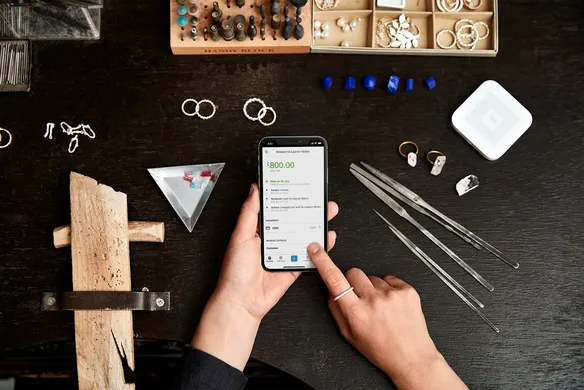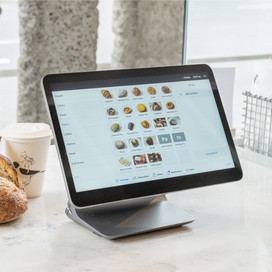Table of contents
The desire for humans to adorn themselves with precious metals and stones is as old as time itself. It’s a tradition that continues to this day, though where these decorations were once reserved for the royals, the rich and the famous, these days almost anyone can afford a little bling.
Which makes jewellery a fantastic business opportunity.
If you’re someone who’s always had an interest in the glitz and glamour of jewellery, who understands fashion and design trends and who has an entrepreneurial streak, you might be tempted to join the industry in a professional capacity.
There’s one problem: You’re not sure how to start your own jewellery business. Don’t fret – we’re here to help.
Requirements to start a jewellery business
First things first. What do you need in order to start a jewellery business, apart from an interest in jewellery?
Skills and knowledge
The depth of skills and knowledge you need will depend on the type of jewellery business you plan to start. You might need skills and knowledge in:
- Carats and karats: The first is a unit of mass used for gemstones, the second is a measure of the purity of gold. Needlessly confusing? Yes. Important to know? Most definitely.
- The four Cs: If you deal in diamonds, you need to develop a deep understanding of the four Cs: cut, colour, clarity and carat.
- Jewellery making: Do you plan to make your own jewellery? You’ll need to invest in a jewellery making course, as well as a selection of tools and equipment.
Licenses and permits
The good news is that for the most part, selling jewellery is much like selling any other fashion item like clothes or shoes. You won’t need much in the way of licences and permits, although there may be a couple of regulatory boxes to tick:
- A second-hand dealer/pawnbroker licence: If you plan to buy and sell second-hand gold, you’ll need a second-hand dealer and pawnbroker licence, which are handed out by state governments (see information on the NSW licence here.)
- Jurisdiction-specific permits: Your state or local council may have its own rules on what documentation you need to sell jewellery in your area. Use this government licence and permit checker to find out what rules apply to you.
- Business registration: Like any business owner, you’ll need to register your enterprise by obtaining an Australian Business Number (ABN) or an Australian Company Number (ACN).
Insurance needed for a jewellery business
We’ve all seen the movies: a burglar somehow breaks into a heavily guarded store or gallery and makes a thrilling escape with a suitcase of rare gems. While you probably won’t have to worry about a Hollywood-style heist, insurance does cover you against far more likely and potentially debilitating events.
- Business insurance: As a business that deals with valuables, your insurance should cover jewellery theft, loss and damage, but should also extend to your premises and their contents.
- Liability insurance: This type of insurance protects your businesses against a wealth of legal claims, like when a product causes injury to a customer or third party.
Deciding the type of jewellery to sell
Rest assured the next step on your jewellery journey is more fun than insurance. It’s time to choose exactly what you’re going to sell.
Jewellery is a competitive industry. There are a number of established players and a huge amount of small businesses looking to make it big. The best way to stand out in such a busy space is to find your niche. Choose a specific type of jewellery, aimed at a specific type of customer, and do it better than anyone else. This also makes stocking, marketing and running your business far easier (but more on that later.)
Jewellery businesses can be largely grouped into two categories:
Fine jewellery
- Made with precious or semi-precious metals and stones
- Luxurious, timeless, high quality and high cost
- Handmade by craftspeople
- Designed to be purchased for special occasions
Fashion jewellery
- Trendy rather than timeless
- Potentially mass-produced, and thus lower quality
- Made from less expensive materials and offered at a lower price point
- Designed to be purchased on a whim
There’s a lot of grey area in between these two categories, such as the hand-crafted yet affordable jewellery that you’ll see on a site like Etsy, but the main point still stands: find your niche, do it well.
Essential equipment needed to start a jewellery business
What equipment do you need to start a jewellery business? The answer to this question depends on whether you plan to buy your stock or make your own.
Hand making jewellery is a complex and costly exercise in terms of equipment. Each of the following techniques demands its own set of tools, and this is by no means a comprehensive list of ways to make jewellery:
- Silversmithing/goldsmithing
- Casting
- Soldering
- 3D printing
- Woodworking
- Laser cutting
- Gemstone setting
Jewellery resellers, on the other hand, simply need display hooks and cases, and potentially some tools for jewellery modification, including:
- Soldering iron
- Blowtorch
- Ring stretcher/reducer
- Pliers, tweezers, clamps and other hand tools
How to find jewellery suppliers
Business registered and licensed, niche found and equipment bought, you’re edging closer to opening the doors of your jewellery business. But before you do, you need something to sell. You’ll need to source suppliers, whether of premade jewellery or the materials you’ll need to make your own.
There are three main ways to find suppliers:
- Search online: Anything and everything can be found on the internet, including jewellery products and materials. Send emails or make calls to jewellery wholesalers to find pricing (which can vary greatly depending on order quantity.)
- Consider dropshipping: A common strategy used by resellers is dropshipping, which sees you advertising products held by a third party and sending them orders to fulfill from their warehouse. This means you don’t need to hold stock at all, though this simplicity comes at the cost of creativity and control.
- Talk to other jewellers: There are many people who have walked this path before, and you might be surprised at how happy they are to help. Speak to jewellers within your personal network or send some messages on LinkedIn.
How to make jewellery
There’s a romance to creating your own jewellery pieces, and when done well it can be a super fulfilling job, both personally and financially. But as mentioned above, making your own jewellery will demand a serious investment of both time and money. You’ll need to:
Take a course in the specific area of jewellery making that interests you. Will you work with metals, gemstones, or more exotic materials? Do you have a certain style of jewellery that you hope to create?
Invest in the tools and equipment that your niche demands. You also need to invest in a well-equipped workspace where you’ll be able to create your pieces.
Consider protecting your creative work – see this article on design rights vs copyright.
How to market your jewellery business
- Through your website: If you’re wondering how to start a jewellery business online, creating a website should sit at the very top of the to-do list. As an eCommerce retailer, you won’t need to pay for shop fronts or market stalls, and you can market yourself affordably with smart search engine optimisation (SEO) practices. Good news: with Square Online, creating an online store has never been easier!
- Word of mouth: People trust people, which is why word of mouth continues to be the most effective marketing channel there is. Spread the word through family, friends and colleagues.
- At local markets: Customers love putting a face to a brand. Set up a stall at a local market, chat to passers-by and hand out business cards.
- Via social media: Jewellery is made for social media. Invest in getting professional shots taken of your favourite pieces, and post regularly across Facebook, Instagram and any other platform that your target market uses.
Payment solutions for jewellery businesses
- POS system: A point of sale (POS) system can form a complete business system for a jeweller – Square POS, for example, is capable of taking payments, offering loyalty rewards, tracking cash flow and managing your team.
- EFTPOS machine: If you simply need to take payments, an EFTPOS machine-like Square Terminal offers an instant, secure and cost-effective way to accept card and contactless payments.
- Portable credit card reader: Even simpler again, portable card readers like Square Reader plug straight into your phone, allowing you to accept chip and contactless payments through your device!
Now that you know how to start a jewellery business, what’s stopping you? If you’re ready to create and/or sell the most stunning of pieces, our team at Square is ready to help.
![]()











